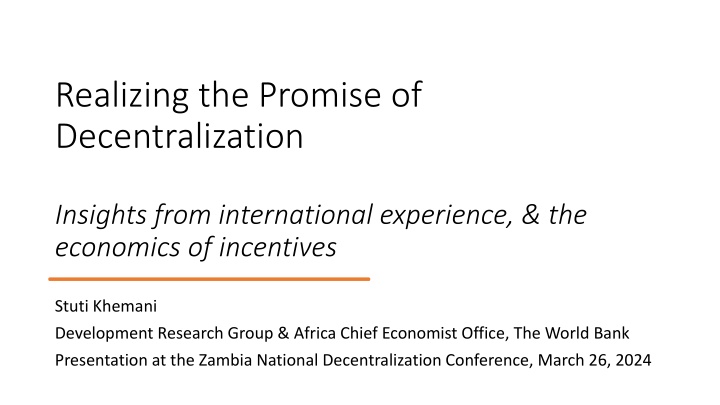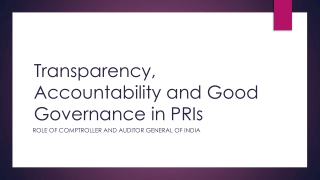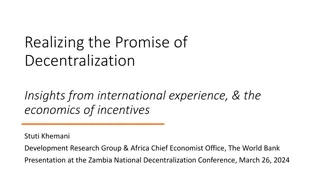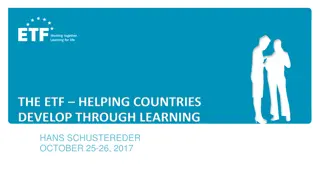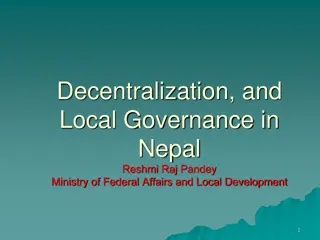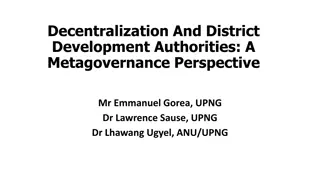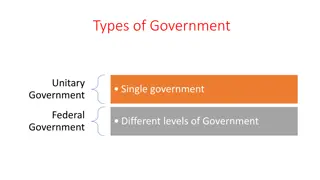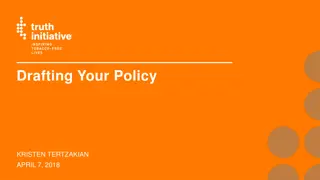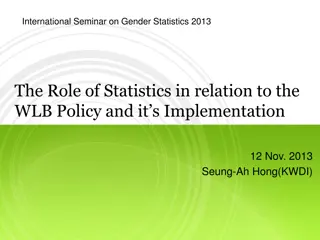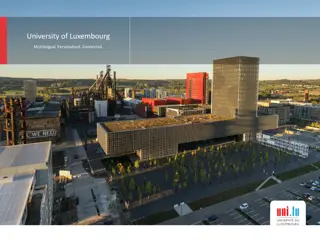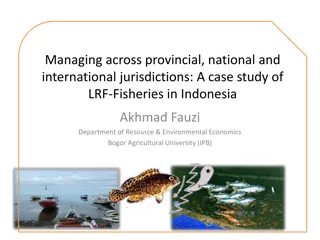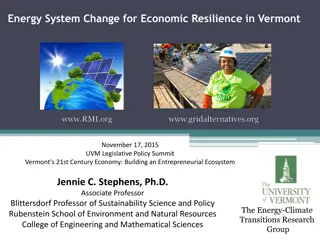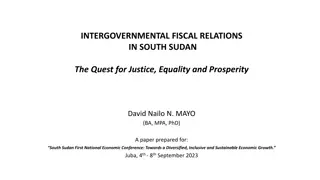Insights on Decentralization Policies: International Perspectives
Understanding the dynamics of decentralization is crucial for effective governance. Insights from global research highlight the challenges in fiscal decentralization, the significance of political decentralization, and the limited scope of Constituency Development Funds in enhancing local governance. Learning from experiences in China, Africa, and India, policymakers can navigate the complexities of designing decentralized policies for sustainable development.
Download Presentation

Please find below an Image/Link to download the presentation.
The content on the website is provided AS IS for your information and personal use only. It may not be sold, licensed, or shared on other websites without obtaining consent from the author.If you encounter any issues during the download, it is possible that the publisher has removed the file from their server.
You are allowed to download the files provided on this website for personal or commercial use, subject to the condition that they are used lawfully. All files are the property of their respective owners.
The content on the website is provided AS IS for your information and personal use only. It may not be sold, licensed, or shared on other websites without obtaining consent from the author.
E N D
Presentation Transcript
Realizing the Promise of Decentralization Insights from international experience, & the economics of incentives Stuti Khemani Development Research Group & Africa Chief Economist Office, The World Bank Presentation at the Zambia National Decentralization Conference, March 26, 2024
Outline 1. What do we know from voluminous research on decentralization (and re- centralization) policies across the world? 2. Why is the experience of local government in China important to learn from and yet, not directly replicable in different contexts? 3. What are we learning from current policy advances in Africa, especially Zambia? 4. What are the concrete implications for the design of decentralization policies going forward?
What decentralization looks like From voluminous research over decades: Fiscal decentralization is very limited, especially in Africa and South Asia Political decentralization in the form of competitive elections for leadership positions in local government has taken hold
Fiscal decentralization limited General reluctance among national leaders to decentralize actual control over fiscal resources Tightly controlled central grants to hundreds of rural, community-based jurisdictions, with no/little own-revenue bases Fragmentation/multiplication of grants-dependent rural local governments Too little decentralization to urban centers (e.g. in India, vs. China), which would actually have the potential for generating own-revenues from local tax bases (e.g. property) Latin America more advanced: municipal governments financed with own-source revenues, and systematic fiscal transfers with effectively decentralized control
Constituency Development Funds? Not many countries have them Because CDFs are allocated to national member of parliament s (MP s) electoral constituencies, rather than locally elected executive government, not examined in research literature as part of decentralization, per se Research literature focuses on CDFs role in shaping incentives and accountability of MPs Lessons from one of the first CDFs, in India, established in 1993 (Keefer and Khemani, 2010) Another strand is examining Zambia s CDF as a CDD (community-driven- development) program (Casey et al IGC policy paper, 2021)
E.g. Indias MPLADS Each MP, elected from single-member constituencies, allocated >.5million$ per annum, to spend on local public infrastructure (e.g. roads, bridges, school buildings, water bodies, sanitation facilities, etc.) What is not spent can be accumulated into the next year for the constituency, even if the MP changes due to fresh elections Similar institutions (as Zambia s) for community participation in local development plans Implementation via local governments: MPLADS is simply added-on to other work already happening on decentralized service delivery, national policy implementation, and local planning for local economic development
E.g. Indias MPLADS Very low rates of utilization in early years of program shows how difficult it is to either spend/or capture the funds (capture is not easy, even in weak institutional contexts!) Across 543 MP constituencies: Utilization 1993-99 (4 MP cohorts) Utilization 2000-03 (1 MP cohort) Median 36% 85% Increase in utilization over time, and evidence on MPs incentives (Keefer and Khemani, 2009; Blair, 2017), consistent with the program making MPs more accountable for constituency service Average 36% 82% Highest 2 78%, 57% 100% Citizen engagement at local level is happening regardless of the CDF program: citizens were already engaging in local government even in the absence of the CDF Lowest 10% 19%
Political decentralization has taken hold Competitive elections for leadership positions in local governments Very high rates of citizen engagement as voters, but perhaps even more importantly, as contenders for leadership positions
Participation in local elections: as voters voters Local Elections National Elections 100 80 % of respondents 60 40 20 0 Zambia(Afrobarometer 2021/2023): 75% report voting in 2021 national elections (question not asked separately for local elections) Source: World Values Survey: Wave 6, question V226; Wave 7, question Q221
Participation in local elections: as leadership contenders leadership contenders Evidence from micro-empirical research across a diverse range of countries Brazil: Ferraz, Finan and Martinez- Bravo (2020) Pakistan: Gulzar and Khan (2021) Indonesia: case study from Berenschot et al (2021) India (Bihar): Khemani, Chaudhury and Scot (2020) Uganda: Eg. Habyarimana, Khemani and Scot (2018)
Despite widespread malpractices in elections % respondents answering "Very Often" or "Fairly Often" Opposition Candidates Prevented from Running TV News Favors Governing Party Voters are Bribed Rich People Buy Elections 90 Violence at the Polls 80 70 60 50 40 30 20 10 0 Latin America Sub-Saharan East Asia (w/o China) South Asia OECD MENA Africa Source: World Values Survey wave 7 (2021) MENA module
Belief in importance of honest elections Honest Elections are Very/Rather Important for our lives 100 80 % of Respondents 60 40 20 0 Latin America Sub-Saharan Africa East Asia (w/o China) South Asia OECD MENA Zambia(Afrobarometer 2021/2023): 83% agree with elections as method of choosing leaders, even though there are problems Source: World Values Survey, Wave 7 (2017-2020), Q234 (how important is having honest elections) and Q76 (how much confidence do you have in elections)
Lessons from international experience? Impact of greater devolution of public spending resources on public service delivery, infrastructure, and economic outcomes? Any country that decentralises should expect not one tidy outcome replicated in many localities, but rather a wide variety of outcomes that range from the strongly negative, through the null ( no change ), all the way to highly positive responses. (Faguet, 2024)
Lessons?: China Dramatic economic transformation of China rooted in economic entrepreneurship and infrastructure investments by local government officials Evidence in Ang (2018): How China Escaped the Poverty Trap Comparison of Chinese versus Indian experience by Mookherjee (2021): Tale of Two Asian Tigers fiscal powers of city governments in China (versus lack of such powers in India) is the key difference
Lessons?: history of UK and US Political and Fiscal Reforms during the Industrial Revolution in the UK in the 1800s, and the Progressive Era in the US in the early 20th century Expansion of franchise to undercut clientelist politics, and strengthen municipal government incentives to invest in public infrastructure (UK) Social movement in the US (known as the Progressive Era) to expose political corruption (via media) and strengthen professional bureaucracies: driven by citizens (and business groups) demand for local public infrastructure to support local economic activity
Lessons from many more countries (Bolivia, Brazil, Mexico, Uganda, Indonesia ) Stock-taking of evidence Key role of political engagement by citizens, in different ways across the spectrum from competitive democracy to controlled autocracy Existence of forces of local electoral institutions within countries across the spectrum Characteristics of local elections matters profoundly for the economic impact of decentralization
Lessons from many more countries (Bolivia, Brazil, Mexico, Uganda, Indonesia ) Direct Democracy vs. Representative Democracy Where are citizens more actively engaged (and thus revealing what they are willing or able to do): in local elections to select representative government leaders who govern on their behalf? or in participatory committees to directly govern how public resources get used? Where do citizens have greater capacity to ensure local economic development from the use of devolved resources?
What about local capacity? Research on how states build capacity to pursue good policies, win compliance with citizens to generate public revenues to provide public goods needed for thriving economies History of how state capacity came about in today s advanced economies: key role of citizens demand for public goods from representative government (Besley and Persson, 2009) Problem of isomorphic mimicry in developing countries: looking like a state but still lacking real capacity to achieve real outcomes (Pritchett, Woolcock and Andrews, 2013) Many unanswered questions about the role of central governments and international partners in providing technical assistance to local governments: Evidence from Tanzania (Di Maro, Evans, Khemani, Scot, 2022)
To Summarize: 1. What do we know from voluminous research on decentralization (and re- centralization) policies across the world? 1. Fiscal decentralization is very limited, and fluctuates with re-centralization 2. Local governments in Africa typically have very few resources, and even what they do receive is tightly controlled by central government agencies 3. CDFs are not commonly understood as decentralization to local government: Zambia s initiative can serve a global public good of knowledge on how CDFs can contribute to local economic development
To Summarize: 2. Why is the experience of local government in China s economic transformation important to learn from and yet, not directly replicable in different contexts? 1. Local officials canplay transformational roles to bring about local economic growth 2. For local officials to effectively play these roles, they have to have the appropriate incentives and motivation, aligned with local economic growth 3. Research suggests that in countries like China, these incentives and motivation arise from centuries-long institutions of well managed bureaucracies, and social networks among local officials 4. The question for countries like Zambia, going forward, is how to leverage their own institutional context to strengthen incentives and motivation of local officials to use devolved resources to bring about economic transformation
To Summarize: 3. What are we learning from current policy advances in Africa, especially Zambia? 1. National leaders want to pursue resource devolution to local levels as a core part of their policy strategies to bring about economic transformation and deliver results to the people 2. Yet, they remain embroiled in a dilemma: how to ensure that the resources will be effectively used? 3. Could the institutional context of active citizen engagement in local elections be used to make local officials motivated and accountable for delivering economic transformation?
To Summarize: 4. What are the concrete implications for the design of decentralization policies going forward? Some initial ideas to offer: 1. Leverage existing forces of local political contestation, where citizens are actively participating not just as voters, but perhaps more importantly, as contenders for local leadership 2. Experiment with giving greater autonomy to locally elected governments over devolved funds, with three areas for central intervention to ensure good economic outcomes: 1. Generate credible data and evidence on the performance of local governments in delivering infrastructure, services, and economic outcomes, using the resources devolved to them 2. Facilitate deliberation over local government resources and performance using locally salient media, such as community radio 3. Provide access to technical training, where needed, for local officials to pursue local economic growth
Conclusion Decentralization is not one thing context specific, history-dependent Design of decentralization matters for how it works (or not) for achieving economic transformation Two broad lessons for Africa, including Zambia: 1. More attention to data-based assessment of performance of executive local government in local economic development 2. More leveraging of local political contestation accountability to voters, but also selection of good leaders, and peer pressure among local leaders
Conclusion Concrete ideas offered for decentralization policies in Zambia to achieve economic impact and deliver results to the people: 1. Generate credible data and evidence on the performance of local governments in delivering infrastructure, services, and economic outcomes, using the resources devolved to them Facilitate deliberation over local government resources and performance using locally salient media, such as community radio Provide access to technical training, where needed, for local officials to pursue local economic growth 2. 3. These ideas can be pursued in a learning by doing manner, without waiting for research to happen Experimentally implement as part of current overarching policy framework; monitor and evaluate; iterate and refine (policy is a continuous process)
